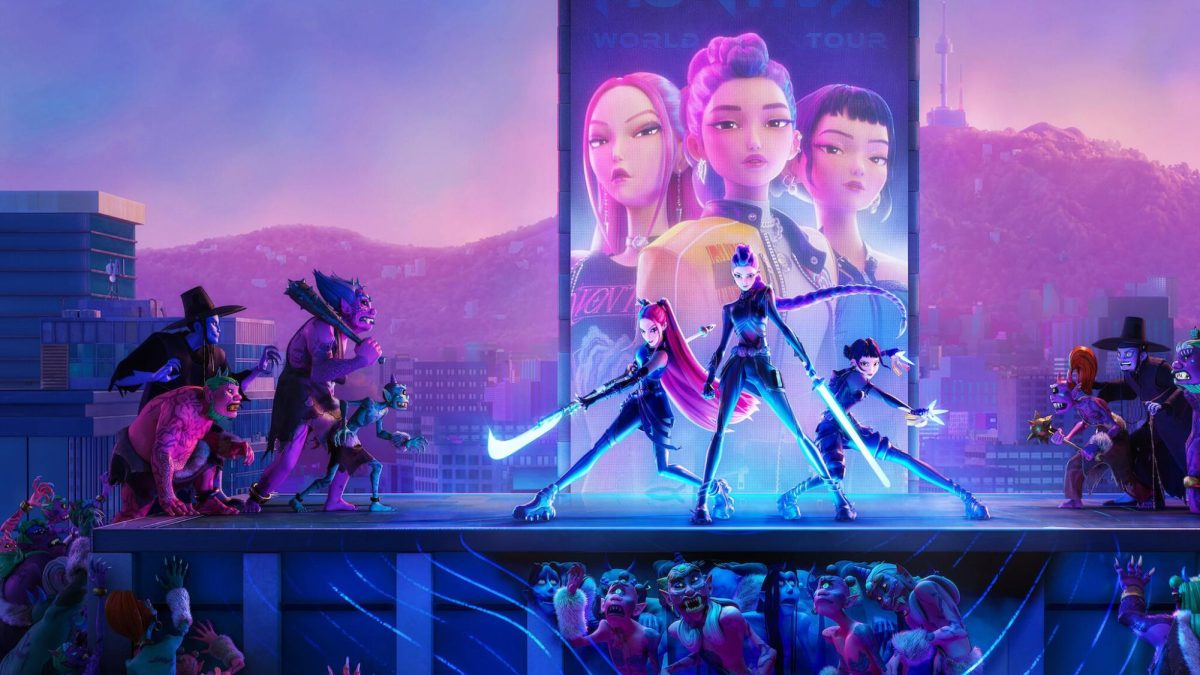“KPop Demon Hunters” launched on Aug. 23, it didn’t just make a splash— it distinguished itself and, in my opinion, is the film of the summer. The Sony Pictures Animation film became Netflix’s most-watched English-language movie ever, with hundreds of millions of streams, and its soundtrack rose to fame as a global hit phenomenon. While the mash-up of K-pop and supernatural fantasy may seem quirky at first, it resonated far more deeply with its fandoms, record-breaking charts and popularity amongst people from all backgrounds.
At its core, “KPop Demon Hunters” follows the K-pop girl group HUNTR/X featuring Rumi (voiced by Arden Cho, singing voice Ejae), Mira (May Hong, singing voice Audrey Nuna) and Zoey (Ji-young Yoo, singing voice Rei Ami). By day, they are pop idols; by night, they channel their singing into a magical barrier that keeps soul-hungry demons away, who are led by an evil tyrant, Gwi-Ma (Lee Byung-hun). The spirit-king employs the Saja Boys, a demon boy band, led by Jinu (Ahn Hyo Seop, singing voice Andrew Choi), to captivate audiences and harvest their souls.
The film explores an identity crisis when Rumi is revealed to be part demon herself and faces internal battles of maintaining her voice while safeguarding the truth from her friends. Her struggle to accept both sides of herself feels relatable to anyone balancing multiple personas, like idols, and even ordinary pressure that people face in their daily lives. As the Honmoon weakens, Saja Boys perform their largest concert featuring the song “Your Idol,” turning the audience into a vessel for demonic energy. Her hidden heritage is the key to understanding why the Honmoon barrier is weakening because her dual nature disrupts the group’s cooperation. This forces Rumi to confront her fear of rejection while realizing that embracing her identity is the only way to restore balance to the Honmoon as well as herself. In the end, HUNTR/X saves the world by reuniting and singing together to seal the Honmoon once and for all.
The film’s visuals lean hard into Korean culture. Viewers can spot dokkaebi (Korean mythical goblins), hanbok-inspired styling (especially in “Your Idol”), references to Seoul’s skyline, bathhouse culture and folklore motifs sprinkled throughout the film. It feels proudly Korean both visually and emotionally, especially in K-drama-esque scenes involving Rumi and Jinu.
“KPop Demon Hunters” attracted something audiences already craved but rarely saw executed this well. It treated K-pop culture as a whole system, not just a simple theme. The movie shows that idol culture involves tremendous personal sacrifice, like skipping holidays, maintaining a public image and performing relentlessly. By showcasing these realities, it uses them to fuel the story rather than leaving them in the background. Furthermore, I appreciate how it integrates Korean culture within the story rather than using it for “exotic touches.” The folklore, music production and visuals give it an authentic feel that draws in fans of Korean culture (and convinces doubters).
In addition, the songs are legitimate pop hits. They are great pop songs on their own but even more special in how they drive the story forward. The singles “Golden” (by HUNTR/X Ejae/Audrey Nuna/Rei Ami) and “Your Idol” (by Saja Boys) topped charts globally. The full soundtrack reached No.1 on the Billboard 200 in its second week after the premiere. On Spotify, every song from the film has appeared on daily top charts. The commercial success of the film’s songs helped its audience grow from a dedicated K-pop fandom to a mainstream cultural event, with covers and dance challenges taking over social media.
Given its streaming and musical success, the franchise is already expanding. Netflix offered a limited sing-along theatrical release to let fans experience it live. The film’s universe has also expanded via collaborations with Fortnite (skins, emotes, demon game modes), merchandising and plans for sequels and spin-offs are actively in development. Jefferson’s 40th Homecoming this year was no exception to the franchise’s popularity, with many MEX performances featuring songs from the film.
“KPop Demon Hunters” didn’t just ride the K-pop wave; it amplified it “up, up and up”. It deserves recognition as the film of the summer for uniting crossover appeal, featuring authentic Korean elements, honoring the work that goes into being an idol and presenting a soundtrack that transcends the movie. Whether you came for the visuals, the idols, the fantasy, or the music, you’re left immersed in its world. It’s more than just a film; it’s a moment in cultural history, taking the world by storm.

